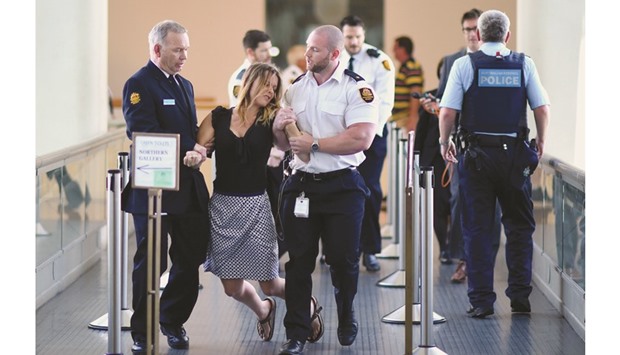Australian Prime Minister Malcolm Turnbull secured the passage of some cornerstone legislation yesterday but quickly suffered an embarrassing defeat of a government plan for a lower “backpacker tax” on work done by young, foreign visitors.
Turnbull, facing pressure over a slump in his standing in opinion polls, was able to secure the passage of a law setting up a building-industry regulator after he struck a deal with independent senators.
The prime minister has pinned his political fortunes to the introduction of a building-industry regulator, using the Senate’s rejection of earlier such legislation as a trigger to call an election in July, when he secured a narrow victory.
But soon after securing passage of legislation on a regulator, the Senate rejected a government proposal to lower the tax paid by foreign travellers on income they earn, often in rural jobs such as fruit picking.
Turnbull now faces the prospect of angry rural voters who argue the current 32.5% “backpacker tax” poses a risk to exports of fruit, which are set to earn a record A$2.27bn ($1.70bn) next season.
“We remain optimistic that we can persuade the senate to change its mind,” Turnbull told reporters in Canberra.
Turnbull this week said his government had reached an agreement with independent senators to lower the tax to 15%.
The senate, however, rejected that deal, passing an alternative rate of 10.5%. Without a compromise by Friday, the tax rate will be fixed at 32.5% on January 1.
Turnbull has been expected to focus on economic reform, a traditional area of strength for conservative governments like his, but he will need to turn around negative polls to avoid internal challenges, political analysts say.
“One of the rationales for replacing Abbott was the 30 consecutive bad polls, he will need to arrest the slide in popularity to avoid a similar pressure,” said Haydon Manning, professor of political science at Flinders University, referring to previous prime minister, Tony Abbott.
About 30 protesters clashed with security guards at Australia’s parliament yesterday, some glueing themselves to handrails and shouting “close the camps”, in a rowdy demonstration against the detention of asylum seekers in remote Pacific camps.
The protesters, who reached the parliamentary public gallery above sitting politicians, forced Prime Minister Malcolm Turnbull to leave the chamber and the suspension of parliament.
Many protesters were wrestled to the ground by security and dragged from the chamber.
“We are here today because you have become world leaders in cruelty,” one protester shouted, according to local media.
Under Australia’s tough border security policy, asylum seekers intercepted trying to reach the country by boat are sent for processing at the camps on Papua New Guinea’s Manus island and Nauru in the South Pacific.
Both major Australian political parties support the offshore detention policy, which has won elections, despite widespread criticism by the United Nations and human rights groups which say the detention amounts to abuse.
Even if detainees are determined to be genuine refugees, a process which can take years, they are still banned from resettling in Australia.

Security guards hold a protester as they remove protesters from the house of representatives.
